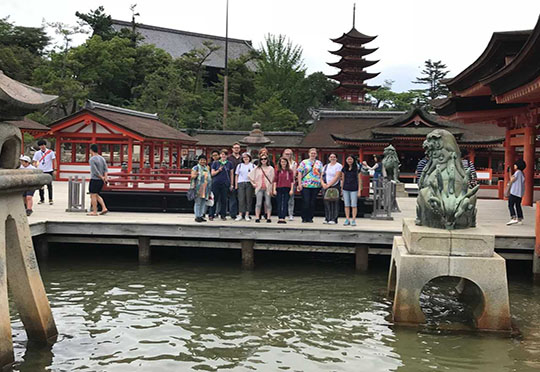Mahua Bhattacharya, associate professor of Japanese and Asian Studies at Elizabethtown College, received a grant of $39,500 from the Japan-United States Friendship Commission (JUSFC) for her May term study abroad trip to Japan in 2019. This is the second year that Bhattacharya has been awarded the grant, and because of the success of her program last year, she has received the full amount that she requested.
“The outcomes of last year’s trip were deemed ‘impressive’ by the JUSFC and I was encouraged to apply again,” Bhattacharya said.
Bhattacharya has been conducting this May term study abroad trip for almost 15 years. In the first two years, she took students only to Tokyo. Last year, with the help of the grant, she went to Fukushima, Kesennuma and Hokkaido for the first time. While this expansion enriched the quality of the program, it was getting steadily more expensive because it involved travelling in the Shinkansen, the bullet train in Japan, and staying in hotels. This increase in cost led to a decline in the number of students, with the price rising to almost $5,000.
“It was slowly becoming out of reach for most students. Rather than cutting down on the quality of the trip, I felt procuring an outside grant would be a better option,” Bhattacharya said.
After receiving the grant and lowering the price of the trip to around $2,200, the program saw a significant increase in the number of students wanting to participate. Now, Bhattacharya is hoping to be able to continue doing this trip every year, switching between going to northern Japan and southern Japan in alternating years.
“Last year, when I promoted the trip, the response was overwhelming. Eighteen students signed up while the grant had provided for ten students, Bhattacharya said. “Despite the limit of ten students, I was able to take thirteen students with the help of other scholarships and college grants. Also this year, over twenty students have already expressed interest,” Bhattacharya said.
After receiving the grant last year, Bhattacharya wrote a report about the success of the trip in accomplishing the goals she had set for the students. The title of the project was “Between Cool and 3.11: Discovering Contemporary Japan through Service Learning and Civic Engagement,” and she listed the following as goals for the trip: increasing the number of students in the Asian Studies program; attracting the College’s interest for supporting the trip; promoting research in multidisciplinary studies; promoting the outreach of the students’ experiences in Japan; understanding the historical context of Japan’s religious and social activities; establishing connections with alumni working at the Japan Exchange and Teaching Program (JET) and Interac, a Japanese education company; and raising the profile of Elizabethtown through Service Learning and Civic Engagement.
“One alumna, Ms. Jessica Besecker, had worked in Kesennuma as a JET employee in a school during the 3.11 triple disaster,” Bhattacharya said about this past May study abroad trip. “She is the one who put me in contact with the school authorities in Kesennuma, one of the areas covered by the trip.”
The College’s one trustee, Kyoko Akanoma, helped arrange the Fukushima trip. One of the service projects for the students on this trip was planting an olive tree in the Hirono Olive Village, which is an area that was affected by the 3.11 nuclear disaster. To help stabilize the economy, people who have moved back to the area are trying to revitalize the olive industry. They chose olive trees because they take nutrients from the air, not the ground which poses a danger of containing radiation. The E-town students named their tree “Jay” in honor of the College’s mascot, the blue jay.
“It was quite instructive for students to see how disastrous a nuclear fallout can be for the economy and people, especially since we are so close to Three Mile Island here.”
Bhattacharya is confident that the trip met all of the accomplishments she outlined in her report. Along with interacting with alumni working for JET and victims of nuclear disaster and the tsunami, students were able to count the trip for not only Asian studies but also get credit for a Cross Cultural Signature Learning Experience. Students were also able to interact with the Ainu indigenous tribe in Japan and learn about their heritage, which was helpful for the two anthropology students on this trip. This year, students will be able to get up to four credits and have it count as an elective for Interfaith Leadership Studies and Peace and Conflict Studies.
“Students should take advantage of this once in a lifetime opportunity. It’s cheap, their professors are with them 24/7, and there is a 2-4 credit course that goes with it which also counts as a signature learning experience,” Bhattacharya said. “And as a bonus, you get to see amazing sights. This is a perfect opportunity, especially if you like to travel.”

